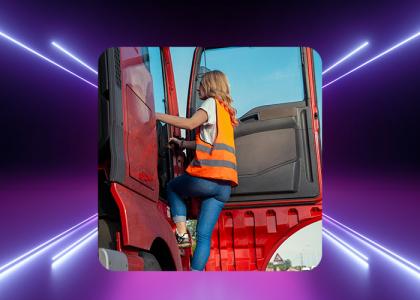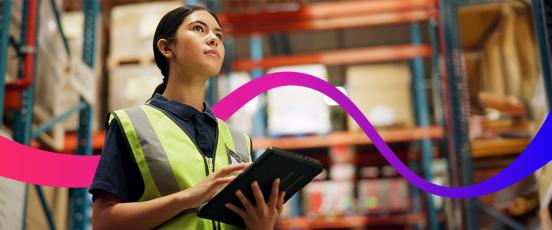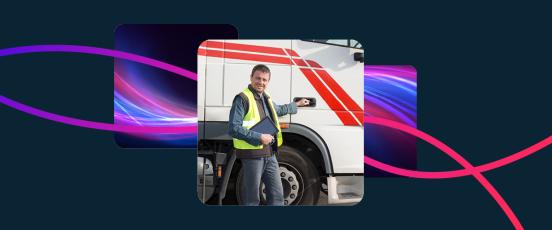A guide to HR and payroll challenges in the logistics industry

From managing a dispersed workforce to addressing high turnover rate, HR plays an important role in keeping supply chains running smoothly, but the transport and logistics industry comes with its challenges. To tackle them head-on, you’ll need to take a strategic approach to HR and payroll.
What is HR’s role in supply chain organisations?
In transport and logistics, operational efficiency depends heavily on people management, so it’s key that HR ensures the right people are in the right roles at the right time. This includes recruiting skilled drivers or warehouse staff, predicting seasonal labour demand, scheduling and rostering across various shift patterns, managing complex payroll requirements, and ensuring compliance with areas such as working time regulations and mandatory training. Let’s take a look at some of these challenges in more detail.
Driver shortages and high turnover
Maintaining a stable workforce is difficult in an industry facing driver shortages and an ageing workforce. With the average age of HGV drivers in the UK standing at 51, and an employee churn rate of 30%, it’s clear that HR faces unique challenges in attracting and retaining talent in this industry. This is largely due to perceptions of long hours and lack of job satisfaction.
Searching for the right talent when you don’t have a competitive edge can be a long-winded and expensive process. It's particularly difficult to recruit younger talent into the transport and logistics industry, but there are proactive steps HR and recruitment teams can take to position their organisation as an employer of choice:
1. Streamline the recruitment process
Reduce time-to-hire and streamline the application process for candidates and recruitment teams with recruitment software. This gives you the tools to automate manual tasks, quickly assess candidates, and provide consistent communication to candidates so you make a lasting impression from day one.
2. Implement a learning and development programme
Employees want to know that their organisation is invested in their development, and a culture of learning and growth is key to achieving high performance. However, MHR’s research revealed that less than a third of employees think their organisation is strong at building this learning culture, and this is largely due to employers struggling to keep up with the demand for training content and materials.
A learning platform takes care of this for you, providing customisable content that aligns with organisational goals and individual employee needs. When you show your employees you’re investing in their learning and development, they’re more likely to stay with you for longer.
Workforce planning
The transport and logistics industry experiences peaks and troughs of activity based on seasonal demand, and this can have a knock-on effect on labour demand. With this, HR has the opportunity to become more strategic, using data for predicting staffing needs to ensure coverage during peak seasons.
It's also essential that HR takes the lead on succession planning by conducting a skills gap audit and identifying younger talent with the necessary skills to fill roles that may become vacant in the future.
Digital transformation and upskilling the workforce
From safety protocols to digital tools, continuous training is vital in transport and logistics. HR has a responsibility to ensure that drivers, warehouse staff, and supervisors are equipped with the skills they need to perform safely and effectively, while also preparing teams for future industry shifts like automation and AI.
Training can be incredibly difficult to keep track of, especially if you’re relying on spreadsheets to log everything. A learning platform can automate the process of compliance tracking and reporting for you, ultimately making it easier to meet legal obligations and upskill your workforce.
Modernising payroll and reporting in logistics
Employees in transport and logistics have extremely varied shift patterns, making payroll requirements in this industry very complex. Relying on manual processes or disconnected systems for payroll allows mistakes to slip through the cracks, leading to late payments, stressed employees, or even fines for non-compliance.
Don’t let outdated systems hold you back. A real-time payroll system lightens the administrative burden by automating payroll calculations and providing up-to-date data for accurate reporting. Our real-time payroll platform People First calculates to 99.9% accuracy, ensuring your people get paid on time, every time, regardless of role, shift pattern, contract, or location.
Plus, with self-service tools, employees can view their payslips in the mobile app with just the click of a button. This also supports their financial wellbeing, as they’ll be able to see exactly what they’re earning as the month progresses and budget accordingly. In high-turnover environments, pay transparency reduces stress and improves workforce stability.
How MHR supports businesses in the transport and logistics industry
At MHR, we support a number of the UK's major transport and logistics companies to streamline their HR and payroll processes. We can help you:
- Manage your organisation’s complex HR, payroll and learning needs
- Streamline the recruitment process for reduced time-to-hire
- Stay compliant with all legislative requirements
- Reduce turnover by improving the employee experience
Ready to streamline your HR and payroll processes? Explore our solutions for transport and logistics.


